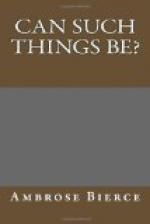In the gray of the morning the two students, pallid and haggard from anxiety and with the terror of their adventure still beating tumultuously in their blood, met at the medical college.
“You saw it?” cried one.
“God! yes—what are we to do?”
They went around to the rear of the building, where they saw a horse, attached to a light wagon, hitched to a gatepost near the door of the dissecting-room. Mechanically they entered the room. On a bench in the obscurity sat the negro Jess. He rose, grinning, all eyes and teeth.
“I’m waiting for my pay,” he said.
Stretched naked on a long table lay the body of Henry Armstrong, the head defiled with blood and clay from a blow with a spade.
THE MOONLIT ROAD
I—STATEMENT OF JOEL HETMAN, JR.
I am the most unfortunate of men. Rich, respected, fairly well educated and of sound health—with many other advantages usually valued by those having them and coveted by those who have them not—I sometimes think that I should be less unhappy if they had been denied me, for then the contrast between my outer and my inner life would not be continually demanding a painful attention. In the stress of privation and the need of effort I might sometimes forget the somber secret ever baffling the conjecture that it compels.
I am the only child of Joel and Julia Hetman. The one was a well-to-do country gentleman, the other a beautiful and accomplished woman to whom he was passionately attached with what I now know to have been a jealous and exacting devotion. The family home was a few miles from Nashville, Tennessee, a large, irregularly built dwelling of no particular order of architecture, a little way off the road, in a park of trees and shrubbery.
At the time of which I write I was nineteen years old, a student at Yale. One day I received a telegram from my father of such urgency that in compliance with its unexplained demand I left at once for home. At the railway station in Nashville a distant relative awaited me to apprise me of the reason for my recall: my mother had been barbarously murdered—why and by whom none could conjecture, but the circumstances were these: My father had gone to Nashville, intending to return the next afternoon. Something prevented his accomplishing the business in hand, so he returned on the same night, arriving just before the dawn. In his testimony before the coroner he explained that having no latchkey and not caring to disturb the sleeping servants, he had, with no clearly defined intention, gone round to the rear of the house. As he turned an angle of the building, he heard a sound as of a door gently closed, and saw in the darkness, indistinctly, the figure of a man, which instantly disappeared among the trees of the lawn. A hasty pursuit and brief search of the grounds in the belief that the trespasser was some one secretly visiting a servant proving fruitless, he entered at the unlocked door and mounted the stairs to my mother’s chamber. Its door was open, and stepping into black darkness he fell headlong over some heavy object on the floor. I may spare myself the details; it was my poor mother, dead of strangulation by human hands!




